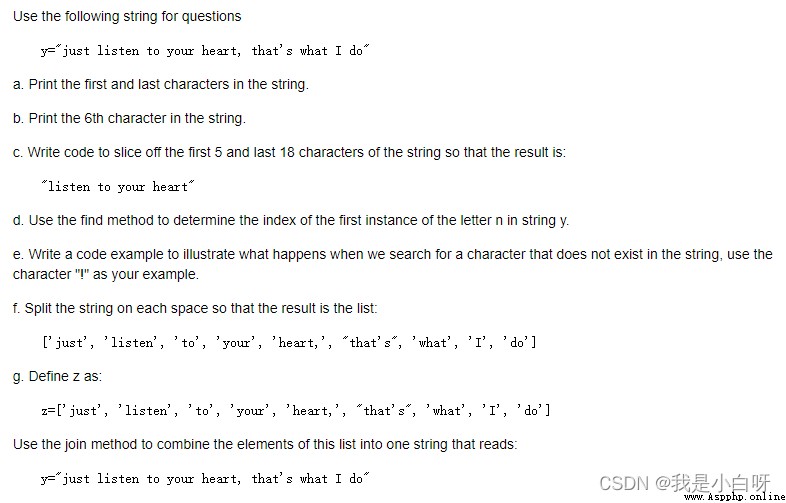Starting today , Xiaobai, I will lead you to learn Python Introduction to zero foundation . This column will explain + Practice mode , Let's get familiar with it Python The grammar of , application , And the basic logic of the code .


def check_types():
## Check the data types
# a. 45
# example solution
print(type(45))
# the value 45 is classified as an integer in python
# b. 27.27
# the value 27.27 is classified as a float in python
# c. True
# the value True is classified as a boolean in python
# d. [3, 4, 5, 6]
# the value [3, 4, 5, 6] is classified as a list in python
# e. 'hello'
# the value 'hello' is classified as a string in python
check_types()
Expected output :
<class 'int'>
<class 'float'>
<class 'bool'>
<class 'list'>
<class 'str'>

def basic_opp(x,y):
# a. exponentiation (power 2)
print(x**2)
# b. multiplication
print(x*y)
# c. division (y divided by x)
print(round(y/x,2)) # this rounds the resulting value to two decimal places
# d. integer division (y divided by x)
print(y//x)
# e. the modulus operator (y modulo x)
print(y%x)
# set some sample values
a=6
b=8
# run the program
basic_opp(a,b)
Expected output :
36
48
1.33
1
2

def string_opp(y):
# a. In one line, print the first and last characters in the string.
# b. Print the 6th character in the string.
# c. Slice off first 5 and last 18 char. result: "listen to your heart"
# d. Find first instance of letter 'n' in string y.
# e. Search for '!' in string y.
# f. Split the string on each space.
# g. Combine elements of list z to generate the full sentence as in string y.
# define the string
s="just listen to your heart, that's what I do"
# run the program
string_opp(s)
Expected output :
j o
l
listen to your heart
10
-1
['just', 'listen', 'to', 'your', 'heart,', "that's", 'what', 'I', 'do']
just listen to your heart, that's what I do

def boolean_opp(a,b):
# a.
# b.
# c.
# d.
# define some sample data
n1=7
n2=9
# run the program
boolean_opp(n1,n2)
Expected results :
True
False
False
True
def check_types():
## Check the data types
# a. 45
# example solution
print(type(45))
# the value 45 is classified as an integer in python
# b. 27.27
print(type(27.27))
# the value 27.27 is classified as a float in python
# c. True
print(type(True))
# the value True is classified as a boolean in python
# d. [3, 4, 5, 6]
print(type([3, 4, 5, 6]))
# the value [3, 4, 5, 6] is classified as a list in python
# e. 'hello'
print(type('hello'))
# the value 'hello' is classified as a string in python
check_types()
def basic_opp(x,y):
# a. exponentiation (power 2)
print(x**2)
# b. multiplication
print(x*y)
# c. division (y divided by x)
print(round(y/x,2)) # this rounds the resulting value to two decimal places
# d. integer division (y divided by x)
print(y//x)
# e. the modulus operator (y modulo x)
print(y%x)
# set some sample values
a=6
b=8
# run the program
basic_opp(a,b)
def string_opp(y):
# a. In one line, print the first and last characters in the string.
print(y[0],y[-1])
# b. Print the 6th character in the string.
print(y[5])
# c. Slice off first 5 and last 18 char. result: "listen to your heart"
print(y[5:-18])
# d. Find first instance of letter 'n' in string y.
print(y.find('n'))
# e. Search for '!' in string y.
print(y.find('!'))
# f. Split the string on each space.
print(y.split(' '))
# g. Combine elements of list z to generate the full sentence as in string y.
z=['just', 'listen', 'to', 'your', 'heart,', "that's", 'what', 'I', 'do']
print(' '.join(z))
# define the string
s="just listen to your heart, that's what I do"
# run the program
string_opp(s)
def boolean_opp(a,b):
# a.
print(a>4 or b<4)
# b.
print(not(a>4 or b>4))
# c.
print((a>4 and b<4) or (a<4 and b>4))
# d.
print((a>4 or b<4) and (a<4 or b>4))
# define some sample data
n1=7
n2=9
# run the program
boolean_opp(n1,n2)
 django 報錯:‘staticfiles‘ is not a registered tag library. Must be one of:
django 報錯:‘staticfiles‘ is not a registered tag library. Must be one of:
報錯內容如下:TemplateSyntaxError at
 Wake up the wrist Python full stack engineer learning notes (framework application)
Wake up the wrist Python full stack engineer learning notes (framework application)
01、Flask Framework server rend